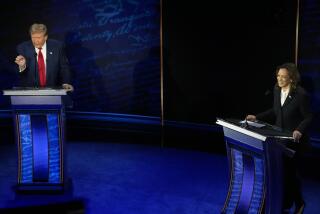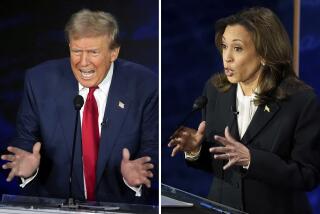Democrats remain united on key issues
- Share via
Putting Sen. Hillary Rodham Clinton under heavy fire, seven Democratic presidential hopefuls sought Wednesday night to separate themselves from the front-runner on such contentious issues as the war in Iraq, healthcare and Social Security.
Although there were some sharp moments on the stage at New Hampshire’s Dartmouth College -- particularly over the war in Iraq -- the debate illustrated yet again how closely the candidates are aligned on policy issues, suggesting that the nomination fight will probably come down to who Democratic voters believe is the most electable.
The debate began with the war in Iraq, which has dominated two successive presidential campaigns, and it drew the first swipe as former Sen. John Edwards of North Carolina criticized Clinton’s statement that, as president, she would continue to mount combat missions in Iraq if warranted.
“To me, that’s a continuation of the war,” Edwards said. “I do not think we should continue combat missions in Iraq.”
Later, when discussing a Senate resolution passed earlier Wednesday that classified the Iranian Revolutionary Guard as a terrorist group -- which Clinton of New York supported -- Edwards brought up Clinton’s reticence in disavowing her 2002 vote authorizing the war. Edwards also voted for the Iraq war, but he later said he was wrong and apologized.
“We learned a very different lesson from that,” Edwards said, adding that he would not have voted for the Revolutionary Guard measure, suggesting it could send the White House a green light to invade Iran. “What I learned in my vote on Iraq was, ‘You cannot give this president the authority, and you can’t even give him the first step in that authority, because he cannot be trusted.’ ”
Clinton remained characteristically cool under fire. She laughed off the jabs and often positioned herself above the fray by complimenting opponents -- sometimes on a first-name basis -- and defending broad Democratic principles over Republican alternatives, as if rehearsing for the fall campaign.
She maintained the poise even when difficult moments of the past were broached, as when Sen. Joseph R. Biden Jr. of Delaware, in a tone of more sorrow than anger, suggested Clinton would have a hard time enacting major healthcare legislation because of baggage from her husband’s administration.
“There’s also a lot of the old stuff that comes back,” Biden said. “It’s kind of hard.” He hastened to add, “When I say ‘old stuff,’ I’m referring to policy, policy.” Former President Bill Clinton’s name surfaced several times, at one point when moderator Tim Russert of NBC News asked whether the candidates would authorize torturing a terrorist who the government believes knows where a bomb is about to explode.
Clinton said that torture “cannot be American policy, period. . . . There is very little evidence that it works.” Told by Russert that her husband had laid out just such a scenario, she said, drawing laughs: “He’s not standing here right now.”
Sen. Barack Obama of Illinois spent much of the evening in the background but did manage to get in a dig at Clinton’s role in pushing the 1993 healthcare plan during her husband’s administration that collapsed in a heap of bipartisan recriminations -- a failure that hangs over her current healthcare proposal.
“If it was lonely for Hillary, part of the reason it was lonely, Hillary, was because you closed the door to a lot of potential allies in that process,” Obama said. “At that time, 80% of Americans already wanted universal healthcare, but they didn’t feel like they were let into the process.”
Obama turned on New Mexico Gov. Bill Richardson later in the debate after Richardson again criticized the other candidates for what he said were policies that would drag out the war -- as opposed to his plan for an immediate withdrawal.
“I think it is important to tell the American people the truth,” Obama said, adding that military experts said troops could be withdrawn safely at a pace of one or two brigades a month.
“It’s the same issue with Social Security, where the pretense is that somehow we can do this magically. We can’t. And I think it’s important for the next president to tell the American people not just what they want to hear or to tell our own base what they want to hear, but what they need to hear.”
Sen. Christopher J. Dodd of Connecticut, who issued a tart statement when it was recently reported President Bush believed Clinton would win the Democratic race -- “I can understand why the president would want Sen. Clinton to be the nominee” -- declined to elaborate when pressed by Russert.
Dodd first tried joking. “This is the same guy who said, ‘Way to go, Brownie,’ ” referring to the president’s post-Katrina praise of disaster chief Michael Brown. “And I think ‘mission accomplished’ was the other one I saw.”
He declined to raise the electability issue. The candidates also set out different positions on how to stabilize Social Security, with all but Clinton saying they would support raising the cap on the amount of income subject to Social Security taxes -- currently $97,500.
Clinton said she would insist on “fiscal responsibility” before offering specific fixes in negotiations with Congress.
“I take everything off the table until we move toward fiscal responsibility and before we have a bipartisan process,” Clinton said. “I don’t think I should be negotiating about what I would do as president. You know, I want to see what other people come to the table with.”
Russert trotted out some of the less-favorable items on several candidates’ resumes, from the city of Cleveland sliding into receivership while Rep. Dennis J. Kucinich of Ohio was mayor, to Richardson’s statement earlier in the campaign that homosexuality was a matter of choice.
Russert asked former Sen. Mike Gravel of Alaska about a personal bankruptcy after he had left the Senate.
“I stuck the credit card companies with $90,000 worth of bills,” Gravel said. “They deserved it, and I used the money to finance the empowerment of the American people with the National Initiative,” his proposal for a national voter referendum system.
Wednesday’s debate, broadcast on MSNBC, was one of more than a dozen Democratic debates or forums that have been held so far, with more to come. TV ratings for Wednesday’s debate weren’t immediately available.
The highest-drawing debate was Aug. 19 at Drake University outside Des Moines, which was seen in about 2.9 million households nationwide, according to the Nielsen ratings.
--
mark.barabak@latimes.com
More to Read
Get the L.A. Times Politics newsletter
Deeply reported insights into legislation, politics and policy from Sacramento, Washington and beyond. In your inbox twice per week.
You may occasionally receive promotional content from the Los Angeles Times.












